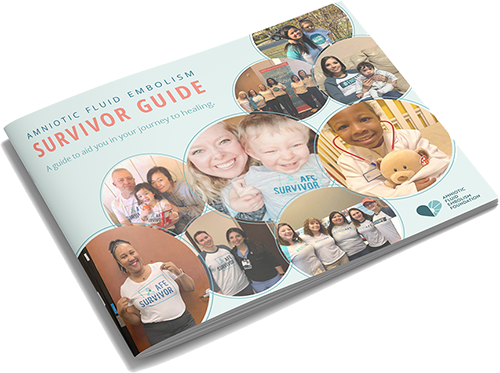Inside the Survivor’s Guide
Let’s Talk Therapy!
Navigating Your Emotions: Finding the Right Therapy After an AFE
Therapy can help you navigate the emotions surrounding an AFE and decrease negativity. Sometimes getting started with therapy can be hard. The information below may help with learning the types of experts, forms of therapy, and how to find one that is right for you.

Types of Support Professionals
- Psychiatrist – A medical doctor who can diagnose, prescribe medication, and offer various therapeutic services.
- Psychologist (PsyD, PhD) – A doctorate-level clinician who can diagnose and offer therapeutic services but cannot prescribe medication.
- Licensed Professionals and Associates – (LMFT, LCSW, LSW, LPC, LMHC, etc.) A master-level clinician that can diagnose and offer various therapeutic services.
- Psychiatric Nurse Practitioners and OBGYNs do not provide therapy but can prescribe medication.
- Life Coaches do not provide therapy and are not trained or licensed to work with trauma. They may be helpful with sleep, parenting, or career coaching.
- A Perinatal Mental Health Specialist is a therapist specifically trained to work with women around complex emotions related to pregnancy, birth, and postpartum.
How to Find a Therapist
- Through Your Insurance Company
- You can either call the number on the back of your insurance card or use the insurance company’s website portal.
- Therapist Directories, Websites, and Organizations
- Women of Color Focused Therapy and Directories
It may take a few attempts to find the therapist that meets your needs so don’t be discouraged!
Common Types of Therapy for Trauma
- Cognitive Behavioral Therapy
CBT is a common form of treatment used by therapists to treat a wide range of mental health concerns. Treatment is centered around how thoughts and beliefs can influence feelings, behavior, and physical sensations. It aims to help clients identify and reshape negative thoughts and belief patterns. - Somatic Experiencing Therapy
Somatic experiencing therapy focuses on a physical body approach, rather than on thoughts and feelings. Treatment may include mindful breathing, sensory awareness, and progressive muscle relaxation. The goal is to have sensations in the body to help release trauma energy. - Narrative Therapy
Narrative therapy helps form a cohesive story or narrative of the trauma to help make meaning of it. The trauma can be re-told from different perspectives or by adding new characters. This may add a sense of meaning or hope to a traumatic event. - Eye Movement Desensitization and Reprocessing
EMDR therapy resolves unprocessed traumatic memories in the brain. Treatment includes targeting a memory or word that represents the trauma while using bilateral stimulation. This includes eye movement or tapping to reprocess the memory and lower the stress of the event or memory. It can be used on past, present, and future memories. It is believed that recalling stressful or traumatic events is less upsetting when your attention is diverted. EMDR has been considered an excellent form of therapy for those suffering from PTSD or PTSD symptoms. Not all therapists are trained in EMDR. Learn more or help find an EMDR clinician.
Therapy for Partners and Spouses
Partners and Spouses are also likely to need support following an AFE. Symptoms of PTSD and postpartum depression seem to be interlinked within a couple. Of the women who develop postpartum depression, 50% of their partners will also develop PPD. The Men’s Center for Excellence is a great resource for partners/spouses.
Affordability
Therapy can be expensive and is a common barrier when seeking treatment. While insurance may include therapy in their benefits, they may not cover all providers or all locations. There are a few other options available to seek affordable mental health therapy.
- Employee Assistance Program (EAP)
If you work for an employer, your company may provide EAP benefits. This allows employees to receive support for mental health concerns that may be interfering with their work. Many symptoms of trauma or PTSD affect executive functioning. This may leave you unable to prioritize, multitask, organize, or focus. Contact your human resources. Find more information on EAP counseling. - Open Path Collective
Open Path Collective is a non-profit organization. They serve clients who lack health insurance or whose health insurance doesn’t provide adequate mental health benefits. After paying a membership fee of $59, the subscriber will have access to therapy for $30-$60 per session.
Inside the Guide
Help us #endAFE!
The AFE Foundation is funded by donations. Every dollar goes toward our support, research, and education programs. We are committed to turning donations into action, including yours.
